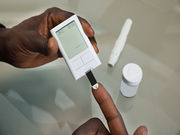Greater change in HbA1c from baseline to 24 weeks with combination therapy versus monotherapies
TUESDAY, Sept. 20, 2016 (HealthDay News) — Gemigliptin combined with metformin is superior to monotherapy with either drug for patients with type 2 diabetes mellitus (T2DM), according to a study published online Sept. 13 in Diabetes, Obesity and Metabolism.
Soo Lim, M.D., Ph.D., from the Seoul National University College of Medicine in South Korea, and colleagues randomized 433 patients with T2DM with a glycosylated hemoglobin (HbA1c) level of 7.5 to 11.0 percent and fasting plasma glucose concentration <270 mg/dL to receive either gemigliptin plus metformin, gemigliptin alone, or metformin alone. The change in HbA1c at 24 weeks was assessed as the primary end point.
The researchers found that from baseline to week 24 the mean changes in HbA1c were −2.06 percent, −1.24 percent, and −1.47 percent, respectively, in the combination, gemigliptin monotherapy, and metformin monotherapy groups, respectively. For between-group differences in HbA1c changes, the 95 percent confidence intervals were −1.02 to −0.63 for the combination group versus the gemigliptin group, and −0.82 to −0.41 for the combination group versus the metformin group. Compared with the monotherapy groups, the percentage of patients in the combination therapy group that reached the target HbA1c level <7 percent (or <6.5 percent) was significantly higher. There were no reports of serious side effects.
“In T2DM patients, the initial combination of gemigliptin and metformin had superior efficacy without safety concerns compared with monotherapy with either drug,” the authors write.
Copyright © 2016 HealthDay. All rights reserved.








